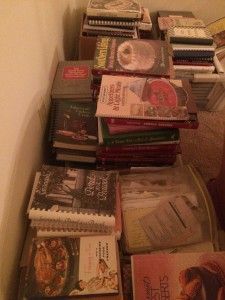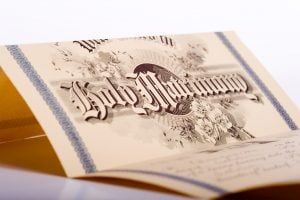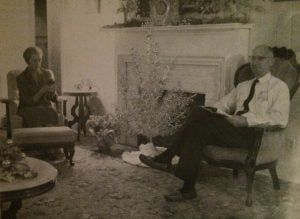But What About the Books?

I am a lover of books, pure and simple. I do not want my reading material on an iPad or a Nook or a Kindle or any other new-fangled piece of technology. I want to hold a book in my hands, to feel the pages beneath my fingers, to be able to close it when I am finished and place it back on the shelf with a sense of accomplishment. And I want to own it. I do not want to check it out or borrow it—and I prefer hardback volumes to paper. They simply last longer.
You might say I have a certain degree of reverence for books. They can take me places I will never visit otherwise and introduce me to people that I can watch from a distance while delving into their lives. That reverence might, on occasion, be misinterpreted as an obsession. At least some might think that when they walk into my library (yes, I have a library . . . don’t judge me). Shelf after shelf is filled with books, most all of which I have read, with the exception of those that I “inherited” from my grandfather and my grandmother-in-law. I place that word in quotation marks because they really came to live with me by default. No one else wanted them. So I adopted them and gave them a good home. It’s how I came to possess a complete set of “The Books of Knowledge” as well as a 1925 copy of “College English Grammar” with my grandfather’s handwritten notes penciled throughout and his name, Paisley Shackelford, inked onto the first blank page along with the notations that he was to “write an 8 word sentence with each word a different part of speech” and “make a list of 20 idioms found in speech and writing”. I don’t even know what an idiom is.
It’s the reason I am the proud owner of “Pork Production” by William W. Smith, a book that bears the inscription, “To a dear boy on his birthday, June 20, 1951. From Mother, with worlds of love.” This from a woman who looked like she could spit nails in every picture I’ve ever seen.
And now, I am caught between the proverbial rock and hard place. When my parents’ furniture was no longer of any use to them because they were no longer here, my son and his wife asked if they might take the dining room suite for their new-to-them house. It consisted of a solid cherry table with matching chairs and a matching china hutch with doors that slid across the top and opened on the bottom. And there was one really nifty door that spanned the center of the hutch and could drop down to function as a sort of serving area. I’m sure it was a new purchase when they built their house in 1955; the style is right for the time period and it was around as long as I can remember . . . and I came along in ’56. When they moved, so did the dining room furniture, but with a new purpose. It lived upstairs in the sitting area, to be used for school work or playing games, or just to take up empty space without added expense. And the hutch became the storage cabinet for my mother’s cookbooks. Actually, it became the clown car for her cookbooks, for when I began to empty it once my brother and I agreed that it could reside elsewhere, it took every box I could find, and still I have mountains of cookbooks scattered across the floor.
Cookbooks are not my only issue. If I walk to the other end of the sitting room and begin opening the cabinet doors there, I find a treasure trove of Earl Stanley Gardner’s Perry Mason mysteries, tons of Mary Higgins Clark novels, and who knows what else that is hidden behind the first rows. When the time comes, as it surely must, where will it all live?
I can’t give books away. Not my mother’s cookbooks with her notes and handwritten recipes stuffed inside. Not the mysteries or the school books or whatever else is currently collecting dust. What if no one in the family wants them? I remember watching a television show once where the families were basically hoarders and this person would come into their homes and help them dispose of items that were deemed unnecessary. In one episode, the wife had inherited her grandmother’s Reader’s Digest Condensed Books. I love those books. I have scads of those books. There are volumes of those books hidden away in the apartment. And this person suggested . . . actually almost demanded . . . that the wife choose five of them and get rid of the rest. After all, she had her memories . . .
THOSE WERE BOOKS!!!!! You don’t “get rid” of books!! You keep them and love them and surround yourself with them. You hold them in reverence and marvel at their survival through the years . . .
Until there comes a point when there is no more room. When the shelves are full and the attic is full and choices must be made. As with any family attempting to empty a lifetime of memories from a now abandoned abode, I know the time is rapidly drawing nigh when those choices will be forced upon us—and as difficult as that will be, I know I can’t keep the world on a shelf, gifting my children with the responsibility of disposition.
Or maybe I can . . .
The post But What About the Books? appeared first on Shackelford Funeral Directors | Blog.












